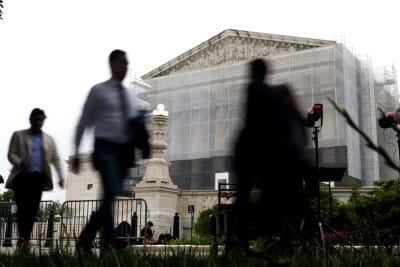Sept. 10 (UPI) — The Supreme Court on Tuesday said it would review a challenge to President Donald Trump‘s sweeping tariffs, expediting the case to be heard in two months.
The high court justices issued the one-page order that set the schedule for the case, with the arguments session to take place during the first week of November.
Trump asked the justices to intervene last week, seeking an early November review by the conservative-leaning high court to make a speedy decision on his controversial tariffs, after twice being told by the courts they are illegal.
“It is gratifying to see the Supreme Court accept these cases on an unusually fast track,” Andrew Morris, senior litigator with the New Civil Liberties Alliance, which filed amicus briefs against Trump’s tariffs in both cases challenging them, told UPI in an emailed statement.
“The court should act promptly to strike down the tariffs. It should hold that the president cannot invoke emergency powers — and national security — to impose tariffs on the American people.”
Since returning to the White House in January, Trump has turned to tariffs as a key tool of his economic policy to right what he sees as unfair trading relationships that the United States has with other nations.
In April, he imposed a 10% tariff on nearly all goods imported from nearly all countries, followed by so-called reciprocal tariffs slapped on specific countries and at specific rates in order to redress those perceived negative trade imbalances.
Trump has argued he has the power to impose the tariffs under the International Emergency Economic Powers Act, which permits the president to implement asset freezes, trade embargoes and other similar economic sanctions during a national emergency.
On April 22, the educational toy manufacturer Learning Resources Inc. sued the Trump administration, arguing the president did not have the power to impose sweeping tariffs, only Congress does.
“The Constitution vests the power to impose tariffs in Congress,” the company said in its complaint, while arguing Trump was misusing the IEEPA, which was intended to impose sanctions on foreign terrorist and hostile nations representing an unusual and extraordinary threat to U.S. society.
“The statute does not mention tariffs or duties, and in the five decades and eight administrations since its enactment, no president besides President Trump has ever invoked IEEPA to impose a tariff or a duty.”
Several other lawsuits followed, and in May, the U.S. Court of International Trade in New York ruled against the Trump administration, finding the tariffs were illegal and that the IEEPA did not give the president import tax powers.
Late last month, a divided appeals court agreed. However, the tariffs remain in place, at least for now.
While Trump and his administration have boasted that the tariffs will raise billions in revenue, critics say it is the American public, and not the foreign companies, that are footing the bill.
